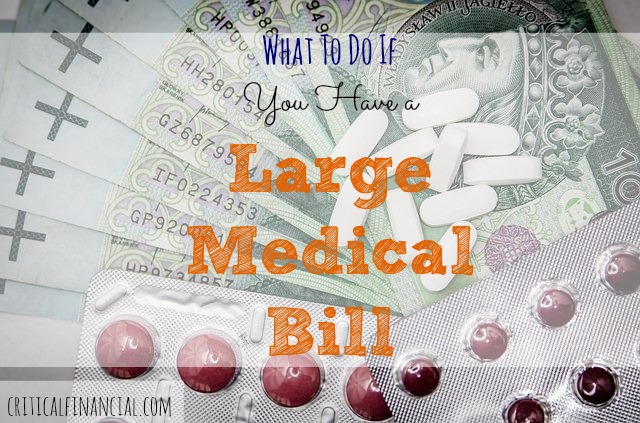Now tha t the Affordable Care Act is in place, consumers are doing their best to keep health insurance as affordable as possible, often by taking larger deductibles. This means that there’s an even greater chance that you’ll get stuck having to pay large medical bills out of pocket, over and above the portion paid by insurance.
t the Affordable Care Act is in place, consumers are doing their best to keep health insurance as affordable as possible, often by taking larger deductibles. This means that there’s an even greater chance that you’ll get stuck having to pay large medical bills out of pocket, over and above the portion paid by insurance.
And ironically, since health insurance premiums are now more expensive than ever, tens of millions of people continue to go without health insurance of any kind. That makes the prospect of large medical bills even more likely.
What can you do if you have a large medical bill, and you don’t have the money to pay immediately?
Stay on top of the paperwork
It’s practically human nature that if you don’t have the money to pay a bill you kind of ignore it. Unfortunately, ignoring bills is not a workable strategy, and certainly won’t make it go away. In fact, quite the opposite – it will make matters worse.
In a real way, if you don’t have the money to pay a large bill you almost need to throw yourself on the mercy of the creditor, who in this case is a healthcare provider.
[adsenseRight]
Generally speaking, most healthcare providers will try to work with you – if you work with them. This point is critical. In order to get the healthcare provider to cooperate with you, you have to do your part. That means that you need to stay on top of the paperwork that they send you. And you need to do it promptly.
In addition to establishing a pattern of cooperation, there’s one other factor on a more practical level. Healthcare providers don’t always send bills to insurance companies, or do so in a timely fashion. They may attempt to bill you directly instead. It’s important for you that this situation does not continue for too long.
Most insurance companies have a time frame within which medical bills must be submitted. If a bill isn’t submitted in a timely fashion, payment by the insurance company could become invalid. You need to make sure this doesn’t happen, and the only way you can do that is by dealing with your bills immediately, and making sure the provider has submitted the bills to insurance as soon as possible.
Investigate all bills for duplicate charges, over-charges or questionable items
Many healthcare providers are much better at providing medical services than they are when it comes to billing. A medical bill, particularly a large one, could contain any number of mistakes. They can come in the form of duplicate charges, overcharges or questionable items, such as services that you’re quite certain were not provided.
In each case, you need to make an issue of these charges to the healthcare provider. The sooner you do this, the easier it will be a straighten the situation out.
It is also possible that an insurance claim was denied for a reason related to healthcare provider error. This can mean improper coding or failure to submit a pre-certification authorization request at the time services were rendered. Whatever the reason for the denial, you will need to get personally involved in any appeals. If the insurance company denies the claim it will fall on you to pay it, even though it was the result of a provider error.
Work with the provider’s finance department
 Even if you make sure that your bills are accurate and that insurance has been properly filed, you can still end up with out-of-pocket costs of many thousands of dollars. One of the best strategies in this situation is to contact the healthcare provider finance department and work out a payment plan.
Even if you make sure that your bills are accurate and that insurance has been properly filed, you can still end up with out-of-pocket costs of many thousands of dollars. One of the best strategies in this situation is to contact the healthcare provider finance department and work out a payment plan.
Laws on these arrangements vary from state to state, but you can often get an affordable fixed monthly payment, with no interest charges. If you have to borrow money, this is probably the best deal you’ll be able to work out anywhere. Set up the arrangement with the finance department, and be sure to get the payment plan in writing before you make any payments.
Once the plan has been established, be sure that you make your payments each and every month. Missing just one payment could invalidate the entire arrangement. If you are in a situation where you may be late, contact the finance department ahead of time to let them know, and see what else you can work out for that month.
Settle a bill for less than the full amount
One advantage when it comes to medical bills is that providers will often settle for less than the full amount. For example, if you owe $3,000, they may be willing to settle the entire account for $2,000.
This should always be a consideration if you have the money to settle the account. If you don’t, a better approach would be to set up a payment plan, and then offer to settle for less than the full amount due at a later date when you do have the money to close out the account.
And this is very important – if a healthcare provider does agree to accept less than the full amount, you must get written confirmation of your agreement before sending any payment. Verbal agreements will not hold up in court.
Ask the provider for hardship consideration
Healthcare providers, especially large ones, will sometimes grant patients a hardship status. This can happen if you are facing a severe health condition, or if your finances are impaired. Some will cut the bills substantially, and others will forgive it entirely. If you are applying for a hardship based on financial condition, you’ll most likely need to provide documentation to the healthcare provider. They may even request that you complete personal financial disclosures, in which your report your income, assets and debt.
The provider may grant a hardship based on the fact that you obviously lack the ability to pay. They don’t do this often, and you probably won’t be able to manufacture a personal hardship to make it happen. But if you are truly a hardship case, you should contact the provider to make this known as soon as possible.
Resources:
https://livelyme.com/irs-tax-

James Hendrickson is an internet entrepreneur, blogging junky, hunter and personal finance geek. When he’s not lurking in coffee shops in Portland, Oregon, you’ll find him in the Pacific Northwest’s great outdoors. James has a masters degree in Sociology from the University of Maryland at College Park and a Bachelors degree on Sociology from Earlham College. He loves individual stocks, bonds and precious metals.

